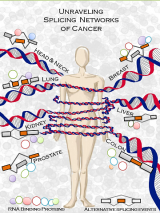
28/04/2016
Scientists of GRIB find a new molecular mechanism involved in the development of cancer
Researchers of the Computational Genomics group of GRIB (UPF-IMIM) led by Eduardo Eyras, have discovered new alterations linked to cancer and have revealed the importance of the transcriptome in the development of tumours. For the first time, scientists have studied the variability of the cell transcriptome in several tumours at the same time, that is, not focusing on the DNA but on the products extracted from it. The results of the study have been published in the journal Genome Research.
The genetic information of cells is encoded in the DNA. This information is read by the cellular machinery, which will generate the so-called RNA and then translate it into proteins. Sometimes, the same gene can give rise to different RNA molecules, which may produce proteins with potentially very different functions. This is due to a process known as "alternative splicing", which influences the synthesis of most of the RNAs and proteins of eukaryotic cells and its regulation depends on the RNA-binding proteins (RBPs).
Despite the importance of alternative splicing in cell function being widely known by the scientific community, the role it plays in cancer has just begun to emerge. This has been possible thanks to new sequencing technologies and the availability of RNA sequencing data of multiple tumours through projects such as The Cancer Genome Atlas (TCGA). Although cancer originates from mutations in DNA, they have an impact on the set of RNA molecules of the cell, known as the transcriptome, which can induce and maintain mechanisms linked to the development of cancer. The research team led by Eduardo Eyras, head of the Computational Genomics laboratory, has unveiled some alterations in RBPs that bring about changes in alternative splicing linked to the development of cancer.
Thanks to the bioinformatics tools developed by the research group, in record time and using limited computational resources, the scientists have been able to carry out a comprehensive analysis of the transcriptome of over 4,000 tumour samples from eleven different types of cancer taken from the TCGA project. This analysis shows that the proteins bound to the RNA are very often altered in human tumours and that these alterations determine the cell transcriptome and induce cell transformations related to the development of cancer. Until now, these alterations remained invisible to the methods used in major cancer genome analysis projects.
With the collaboration of doctors Juan Valcárcel and Belén Miñana of the Centre for Genomic Regulation (CRG), and doctors Miguel Ángel Pujana and Francesca Mateo of the Catalan Institute of Oncology (ICO), the authors have shown that introducing the identified alterations of the transcriptome in non-tumour cells, the latter acquire tumourigenic properties. In addition to expanding our knowledge on the role of RBPs in tumours, the results highlight the importance of alternative splicing as a complementary mechanism in the development of cancer, becoming a new relevant factor to be taken into account in the study of this disease. This research opens up new ways of understanding the biology of cancer and searching for new therapeutic strategies. As the authors say, "the alterations in alternative splicing are particularly important in the context of those tumours that do not harbour known mutations and for which no therapy is known, and, therefore, they may open new opportunities to understand tumour biology and search for new therapies."
This study has been made possible thanks to funding from the Sandra Ibarra Foundation, the Consolider RNAREG project, as well as from projects of the Spanish Government and FEDER funds.
Reference work: Sebestyen E, Singh B, Miñana B, Pages A, Mateo F, Pujana MA, Valcarcel J, Eyras E. Large-scale analysis of genome and transcriptome alterations in multiple tumors unveils novel cancer-relevant splicing networks. Genome Research, 2016. DOI:10.1101/gr.199935.115



